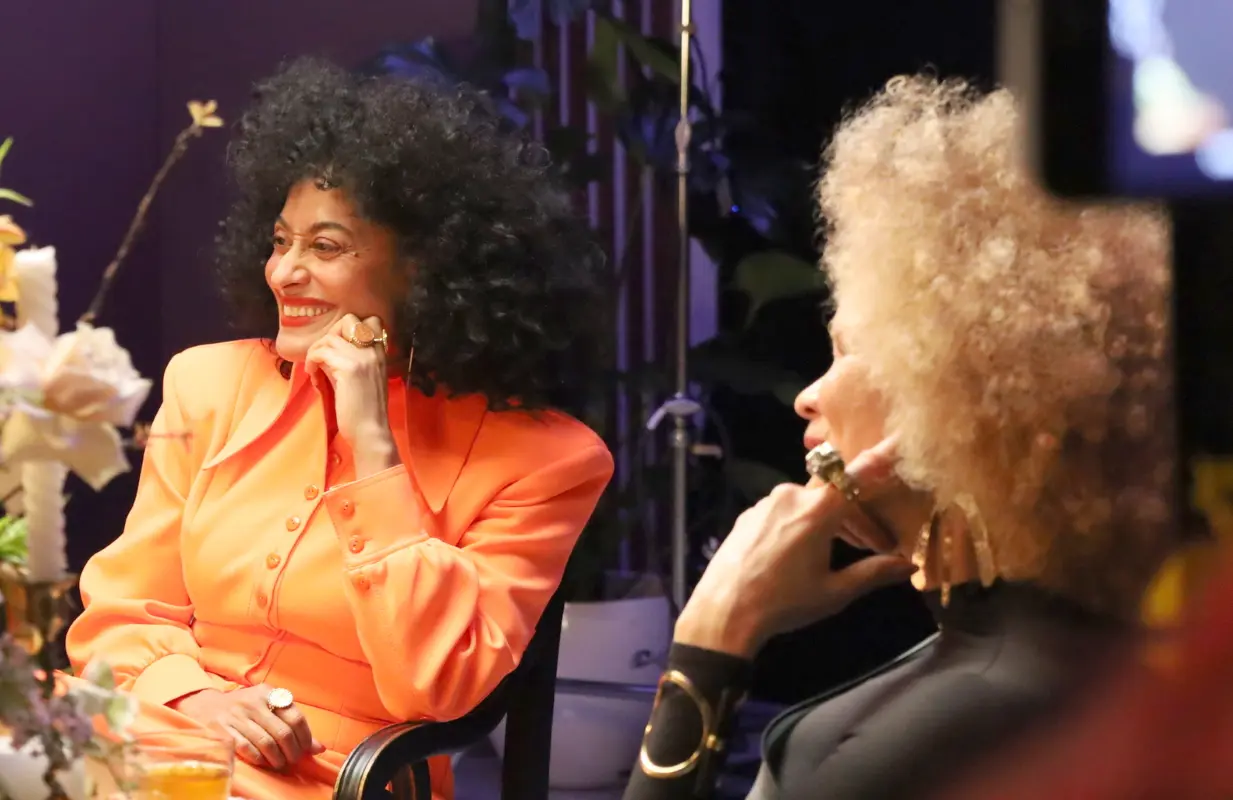The Hair Tales Lets Black Women Speak Without Judgment
-
 Tracee Ellis Ross in The Hair Tales. (Photo: Hulu)
Tracee Ellis Ross in The Hair Tales. (Photo: Hulu)All eyes were on Viola Davis when she appeared on the red carpet at the 2012 Academy Awards. It was a huge night for her — she had landed a Best Actress nomination for her role in The Help — but what really got the media buzzing was her decision to wear her own natural hair, instead of her usual wigs. Later that year, in an appearance on Anderson Live, she explained her decision to rock her own God-given curls: “I took off my wig because I wanted to step into who I was. I still will wear a wig every once in a while, but I felt like every time I put on a wig that I was apologizing for who I was, being a dark-skinned woman. I felt like I was hiding it [and] I didn’t want to do that anymore. The Oscars was the perfect time to do that, so I stepped into who I was.”
The politics around Black women’s hair in America is complicated. How we choose to wear it — straight, curly, braided weaved, loc’d — provokes judgment on our desirability, our social status, even our job prospects. Hulu’s docuseries The Hair Tales, produced by Tracee Ellis Ross, Oprah Winfrey, and image activist Michaela Angela Davis, goes in-depth to unpack and demystify the feelings and politics surrounding this potent subject.
Ross has always been open about her personal hair journey. The daughter of music icon Diana Ross, her hair texture is the product of her mixed-race heritage (her father is Jewish-American music executive Robert Silberstein), which has presented unique challenges in care and styling. In a recent interview with the Huffington Post, she said, “My teen years were really tough with my hair. I relaxed my hair. I did texturizers. I would put heat on my hair when I lived in Europe as a young girl. My hair was just so dead, and all I knew how to do and all that I was having mirrored back to me was to put heat on my hair, heat on my hair, more and more.”
Since then, she has advocated for Black women to embrace and celebrate their hair and created her own hair line, Pattern, which caters to a variety of textures. With The Hair Tales, Ross invites Winfrey, Issa Rae, Chloe Bailey, Marsai Martin, Congresswoman Ayanna Pressley, and many others to share their personal hair stories in a series of one-on-one interviews.
Rae, who credits her mother with raising her to embrace her natural hair, recounts the immense pressure from her school peers to straighten and chemically relax her hair. When she realized the health of her hair was suffering, she decided to do the “big chop” and videotaped it in order to promote her webseries “The Mis-Adventures of Awkward Black Girl.” The popularity of that show helped launch her career in Hollywood, and her choice to wear her hair natural has contributed to the shift in what we deem “glamorous” or “professional” when it comes to Black women’s styles.
The series also explores the topics of texturism and colorism. Texturism — which is a preference for hair with a looser curl over hair with a tighter, kinkier curl — has been a point of contention in the natural hair movement, as most platforms and endorsements are typically biased toward lighter-skinned and mixed-race Black women with a looser curl. Ellis wisely steps back to let the women air their hurt and insecurities over this hair hierarchy. “It was painful to know that the hair growing out of my head wasn’t socially accepted,” Rae says.
Congresswoman Pressley, who in 2020 revealed she had gone bald from alopecia (a disease that causes hair loss), took the shame and trauma from losing her hair and made it a call to action. She helped legislate The Crown Act, which protects Black people from hair discrimination in the workplace and public spaces. For Pressley, it’s crucial that Black women have the right to show up as their authentic selves.
As much as The Hair Tales is a celebration of Black women’s hair, it is also a frank examination of the traumas they have internalized about their appearance. There is a shared history of how our hair was treated as little Black girls and how that’s shaped our attitudes toward our hair today. Scalp irritation from relaxer treatments, the uncomfortable pulling and tugging in detangling our hair, and burns from the hot comb have relayed the message that beauty is pain. It all stems from respectability — from wanting hair to be neat and acceptable, especially in White spaces. “So much of our hair truths are attached to so much trauma,” says interviewee Elle Moxley, the co-founder of the Marsha P. Johnson Institute.
With such a broad perspective, The Hair Tales serves as not only an education on the history of Black women’s hair in America, but also a space to revel in its diversity and beauty. The series is a space of healing for all Black women continuing their personal hair journeys. Ross invites us all to the table, without judgment.
The Hair Tales premieres with two episodes on Saturday, October 22 on Hulu. New episodes weekly through November 5.
Rebecca Theodore-Vachon is a tv and film critic whose work has been featured in Harpers Bazaar, Shondaland Magazine and Indiewire. Follow her on Twitter at FilmFatale_NYC.
TOPICS: The Hair Tales, Hulu, Ayanna Pressley, Issa Rae, Tracee Ellis Ross, Viola Davis